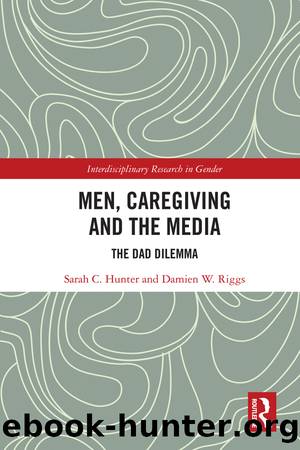Men, Caregiving and the Media by Sarah C. Hunter Damien W. Riggs

Author:Sarah C. Hunter, Damien W. Riggs [Sarah C. Hunter, Damien W. Riggs]
Language: eng
Format: epub
Tags: Family & Relationships, Parenting, Fatherhood, Babysitting; Day Care & Child Care, Social Science, Gender Studies
ISBN: 9780429848834
Google: eXzADwAAQBAJ
Publisher: Routledge
Published: 2019-11-27T04:59:26+00:00
Concluding thoughts
In this chapter we examined the ways in which newsprint media in Australia, the United Kingdom, and the United States represent fathers who take on the primary caregiving role. Strikingly, we found no significant diversity between the countries in terms of the ways in which these fathers were represented. This speaks to the prominence of the themes we identified, and how these accounts do not just construct and represent the experiences of fathers within specific contexts, but rather, provides an insight into the general norms and expectations that fathers within these countries must negotiate with.
In the field of men and masculinities, researchers have argued that we are seeing a shift away from hegemonic masculinity toward what has been termed âcaring masculinitiesâ (Elliott, 2015), âevolved masculinitiesâ (Richards Solomon, 2017), and âmasculine careâ (Stevens, 2015). However, it is important that we do not skip ahead and assume an uptake of a caring role to synonymously mean a rejection of hegemonic masculinity and traditional notions of what it means to be a father. Our analysis suggests that accounts of father involvement are much more complex than this, and in fact, they are contradictory and dilemmatic.
We identified how the news articles appear to promote the idea that fathers can be nurturing caregivers. The articles attended to potential charges of âeffeminacyâ that may accompany men stepping away from traditional understandings of fathering. We identified how they justify and defend the primary caregiving role for men. In this way, it appears the news articles are arguing for the legitimacy of this ânewâ and involved model of fathering. However, our analysis also demonstrates how the news accounts reproduce restrictive hegemonic ideals that actually restrain the encouragement of fathers as caregivers. Specifically, we identified how a variety of practical reasons and explanations were offered up to justify why, in practice, it is unrealistic for fathers to be primary caregivers. These particular reasons were presented as unavoidable facts or just the way things are. Despite there being a degree of legitimacy and weight behind some of these barriers, the news articles mobilised them in a way that presents primary caregiving for men as too difficult, as opposed to providing a critical account of these barriers.
Despite offering up a variety of reasons as to why the primary caregiving role is difficult for men, the news articles went on to sensationalise those men who take the role on, despite these barriers. These men were constructed as especially masculine, as being âstoicâ and âbraveâ, for taking on this difficult and challenging role. These accounts demonstrate how fathers are able to reject the traditional norms of masculinity that do not serve their identity, and hold onto the ones that do. As such, we can see how it is possible to engage in simultaneous rejection and uptake of hegemonic masculinity, rather than simply a wholesale uptake of a caring masculinity (framed as entirely different to hegemonic accounts of masculinity and fathering).
What we have shown in this chapter mirrors previous theorisations of gender inequality (Wetherell et al.
Download
This site does not store any files on its server. We only index and link to content provided by other sites. Please contact the content providers to delete copyright contents if any and email us, we'll remove relevant links or contents immediately.
Should I Stay or Should I Go? by Ramani Durvasula(7667)
The Lost Art of Listening by Michael P. Nichols(7506)
The Rosie Project by Graeme Simsion(6415)
Beartown by Fredrik Backman(5754)
We Need to Talk by Celeste Headlee(5615)
Ego Is the Enemy by Ryan Holiday(5450)
Hunger by Roxane Gay(4928)
Suicide Notes by Michael Thomas Ford(4827)
I Love You But I Don't Trust You by Mira Kirshenbaum(3876)
Mummy Knew by Lisa James(3693)
Not a Diet Book by James Smith(3427)
Crazy Is My Superpower by A.J. Mendez Brooks(3400)
Toxic Parents by Susan Forward(3292)
Girl, Wash Your Face by Rachel Hollis(3282)
The Complete Idiot's Guide to Coping With Difficult People by Arlene Uhl(3149)
The Social Psychology of Inequality by Unknown(3031)
Name Book, The: Over 10,000 Names--Their Meanings, Origins, and Spiritual Significance by Astoria Dorothy(2987)
The Hard Questions by Susan Piver(2976)
The Gaslight Effect by Dr. Robin Stern(2794)
